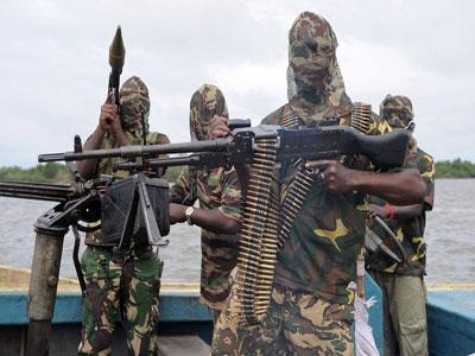In August, the leader of the terrorist jihadist group Boko Haram of Nigeria, Abubakar Shekau, shocked many with the declaration that northeast Nigeria was now an Islamic Caliphate, under his rule. The declaration–along with claims that Boko Haram would not harm villagers–sounded all too similar to that of another terrorist group: the Islamic State.
Now, a report in the UK’s Independent asserts that the reason for this shift in tone–Boko Haram terrorists attempting the new tactic of telling villagers they mean no harm–may be a direct result of cooperation between the two jihadist coalitions.
The Independent notes that Boko Haram’s siege of the town of Gulak little resembled that of other towns in northeast Borno state, including the tactically pivotal town of Bama, close to the regional capital of Maiduguri. In Bama, Boko Haram left a trail of dead bodies strewn on the ground as a message to Christians and other opponents of the group that it would spare no life in its conquest of Nigeria. While villagers ran away as fast as they could from the jihadists and Boko Haram did indeed massacre many of those left behind, reports have surfaced that the terrorists claimed they meant only to establish an Islamist government in the town, not kill everyone.
The newspaper notes that such behavior is new and much akin to the Islamic State’s tactics in places like Raqqa, Syria, the appointed “capital” of the Islamic State. In Raqqa, the Islamic State terrorists claimed they would provide food, electricity, and other necessary goods to Sunni Muslims who adhered to their radical Islamist ideology. The group’s plans have since been significantly crippled by their collective lack of technical expertise; nonetheless, the Islamic State has made strategic moves to capture dams and power plants in hopes of providing traditional government services, in addition to ethnic cleansing, torture, and brainwashing of children.
The similarities between the “post-Caliphate” Boko Haram and the Islamic State have intelligence agencies searching for “a practical relationship” between the two. Some believe the groups are communicating and that the Islamic State is aiding Shekau with advice. Adding evidence to the claim is Shekau’s open support for the Islamic State’s leader, Abu Bakr al-Baghdadi.
Adding to those suggestions that the groups are communicating is news of the Islamic State behaving a bit more like Boko Haram, as well, conducting mass abductions in northern Iraq, both of other minorities and Sunni Muslim women, who are married off or sold in the slave trade. The abductions recall the kidnapping of more than 200 girls from the town of Chibok, Borno, that elevated Boko Haram to the status of an international threat.
The other side of the battle also parallels the fight against the Islamic State in Iraq. The Independent notes that the Nigerian army has all but been driven out of the state of Borno, and many soldiers would rather face the ignominy of desertion than the wrath of Boko Haram: “Reports are rife of desertions, refusals to fight, malfunctioning equipment and low morale. According to one report, soldiers are sent into battle with just 60 rounds of ammunition against well-equipped Islamists.”
In Gwoza, the town seized before the establishment of a “Caliphate,” Nigeria’s Leadership newspaper reports that schools and necessary infrastructure agencies remain closed, and around 20 police officers remain missing. That number is down from the 35 originally missing after the raid in August, as many officers returned to homes of family far from where they could alert authorities that they were safe.
While the indiscriminate attacks on Nigeria’s northeastern villages have taken a toll on entire populations of municipalities, triggering a massive exodus from Nigeria into Cameroon, Nigerian Christians have been particularly hurt by Boko Haram’s advances. Nigerian Christian leaders estimate that at least 350 Christians have been killed this week alone, and multiple churches have been forced to shut down operations in light of the Boko Haram threat. Christians in Adamawa state, south of Borno, have also been the targets of Boko Haram violence, even as the group attempts to solidify its presence in the northern state by organizing a siege of Maiduguri.
In addition to targeting Christians and anyone who opposes its antiquated version of radical Islam, Boko Haram has taken to killing medical workers–currently mostly polio vaccine workers, whom they consider agents of Western education, which, as their name makes clear, they consider sin. A calculated targeting of medical workers could spell disaster for Nigeria as it attempts to fight off the spread of the Ebola virus in southwestern Lagos, a metropolis of 21 million people. While Lagos is miles away from Maiduguri, many Nigerians have begun contemplating the threat to their nation as two-pronged–one which, if the forces of radical Islam and nature collide, could present an existential danger to a government currently too weak to fully fight off a threat like Boko Haram.

COMMENTS
Please let us know if you're having issues with commenting.